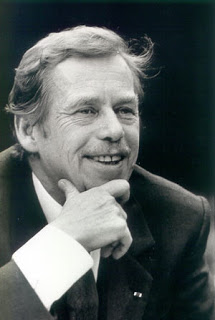Sunday’s death of Vaclav Havel, who led Czechoslovakia out of communism to freedom and democracy was, unfortunately, largely overlooked. But all those new students of politics out there – whether the liberals who became engaged due to the Iraq War, or the conservatives and tea partiers who got involved after Barack Obama’s election – should take a moment to read a wonderful tribute to Havel written by Jocelyn Benson.
Benson, an unsuccessful 2010 candidate for Michigan secretary of state, is the CEO and founder of the Michigan Center for Election Law and Administration. She perfectly labels Havel a “poetic voice” for democracy.
Here’s a portion of her piece, which she wrote for North Star Writers Group:
“Twenty-two years ago this month, the parliament of Czechoslovakia elected Vaclav Havel president. His death on Sunday marks the loss of one of the world’s most strident and poetic voices for democracy.
“Havel demonstrated true political courage throughout his service as president – first of Czechoslovakia and then of the Czech Republic after the nation split. And as the leader of the country’s Velvet Revolution in 1989 – his greatest legacy – he fought to give ‘Power to the Powerless,’ toppling the communist regime that had ruled his people behind the Iron Curtain for more than 40 years.
“Havel was a true public servant. Having no ambition for a career in politics, he sought to empower his fellow citizens through words that communicated the moral imperative of freedom. A self-taught playwright, Havel was denied the education he should have enjoyed. But he worked at his craft, usually having to simultaneously work a variety of odd jobs to make a living. Eventually, his work gained him notoriety and gave him a platform to advocate for basic human rights and freedoms.
“He was a fighter dedicated to shining a light on injustice. His plays were banned for decades. After he published Charter 77, a manifesto calling on Czechoslovakia’s communist regime to adhere to international standards of human rights, he was jailed three times.”
To read the full story click here.
Another memorial to the dissident can be found here.
Here are some of Havel’s best quotes.




